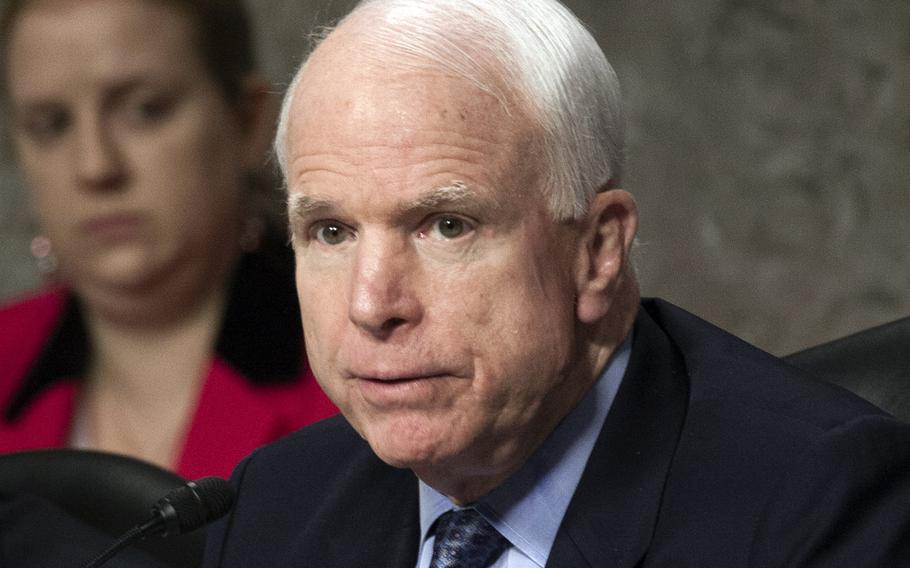
Sen. John McCain, R-Ariz., shown here at a committee hearing in July, has been critical of President Obama’s handling of the fight against Islamic State fighters in Iraq and Syria. McCain is expected to take over the chairmanship of the Senate Armed Forces Committee. (Joe Gromelski/Stars and Stripes)
WASHINGTON — The Republican rout in Tuesday’s midterm elections is widely seen as a repudiation of President Barack Obama’s policies, and high on the list of public discontent is the White House’s foreign policy.
Democrats took a beating at all levels, but the most significant defeat came in the Senate. By taking seven seats from the Democrats with three still in play Wednesday morning, Republicans commandeered both Houses of Congress, and will in January take over committee chairmanships.
John McCain is expected to take the top spot on the Senate Armed Services Committee, elevating pre-election criticism of Obama’s handling of the fight against Islamic State fighters in Iraq and Syria to governance.
While foreign policy and defense strategy are primarily a White House responsibility, the new Republican majority in the Senate and House will have enormous influence over defense spending and priorities.
McCain in particular has ripped the White House for what he sees as a tentative and ineffective campaign against the militant group that has terrorized much of Iraq and Syria.
“I know of no military expert who believes we are going to defeat ISIS with this present strategy,” McCain said at a Pacific Council on International Policy conference on Oct. 18.
“We may be able to ‘contain,’ but to actually defeat ISIS is going to require more boots on the ground, more vigorous strikes, more special forces, further arming the Kurdish peshmerga forces and creating a no-fly zone and buffer zone in Syria,” said McCain, using one of several acronyms for the group.
McCain is also on record saying the U.S. should more heavily arm the Free Syrian Army, and should create both a no-fly zone and a buffer zone to protect and replenish fighters and refugees.
Turkish President Recep Tayyip Erdogan has called on the U.S. to create a no-fly zone where Assad’s air force would be shot down if it entered. McCain said that if the U.S. complied, Turkey would send in its troops to fight the Islamic State.
With the SASC gavel, McCain can more forcefully push the White House and the Pentagon to defend its position of having no U.S. troops anywhere near a firefight in Iraq, and could push the president to relax the ban on U.S. special operators with Iraqi ground units directly engaged in combat. They will also likely press Obama for an expanded air campaign in Iraq.
Obama has repeatedly promised that he will not send ground troops to Iraq and Syria. Instead, his strategy has been to help Iraqi and Syrian forces defeat the Islamic State on their own.
There will also be scrutiny of the plan to train moderate Syrian rebels.
Obama asked Congress to authorize a plan to arm and train 5,000 “vetted, moderate” Syrian rebel troops in Saudi Arabia to take on the Islamic State militants.
But several have questioned this idea. If the United States spent $25 billion on training Iraqi Security Forces over eight years, only to watch them drop their weapons and melt away in the face of ISIS attacks, critics have asked whether such a paltry number of rebels would fare.
Those doubts were compounded Sunday when the Washington Post reported that moderate rebels who had been armed and trained by the United States either surrendered or defected to al-Qaida-affiliated fighters swept through northern Syrian towns and villages the moderates controlled, in what appeared to be a concerted push to vanquish the moderate Free Syrian Army.
Even former President Jimmy Carter has criticized Obama for inaction on the Iraq crisis.
In an October interview with the Fort Worth Star-Telegram, the 39th president said the Obama administration, by not acting sooner, allowed ISIL to build up its strength.
“We waited too long,” Carter said. “We let the Islamic State build up its money, capability and strength and weapons while it was still in Syria. Then when [ISIL] moved into Iraq, the Sunni Muslims didn’t object to their being there and about a third of the territory in Iraq was abandoned.”
But it was the Republicans and their proxies who hammered Obama on his ISIS policy in the run-up to the elections.
Kentucky’s Mitch McConnell, who will lead the Senate beginning Jan. 3, has criticized Obama for approaching Islamic militants in Syria and Iraq as a “manageable” problem instead of a serious security threat.
“The president should come up with a strategy, present it to Congress, address the American people and tell us how he believes we should stop them,” McConnell told the Fox Business Network in September. “This is not, in my view, a manageable situation. They want to kill us.”
Dickson.patrick@stripes.com Twitter: @StripesDCchief